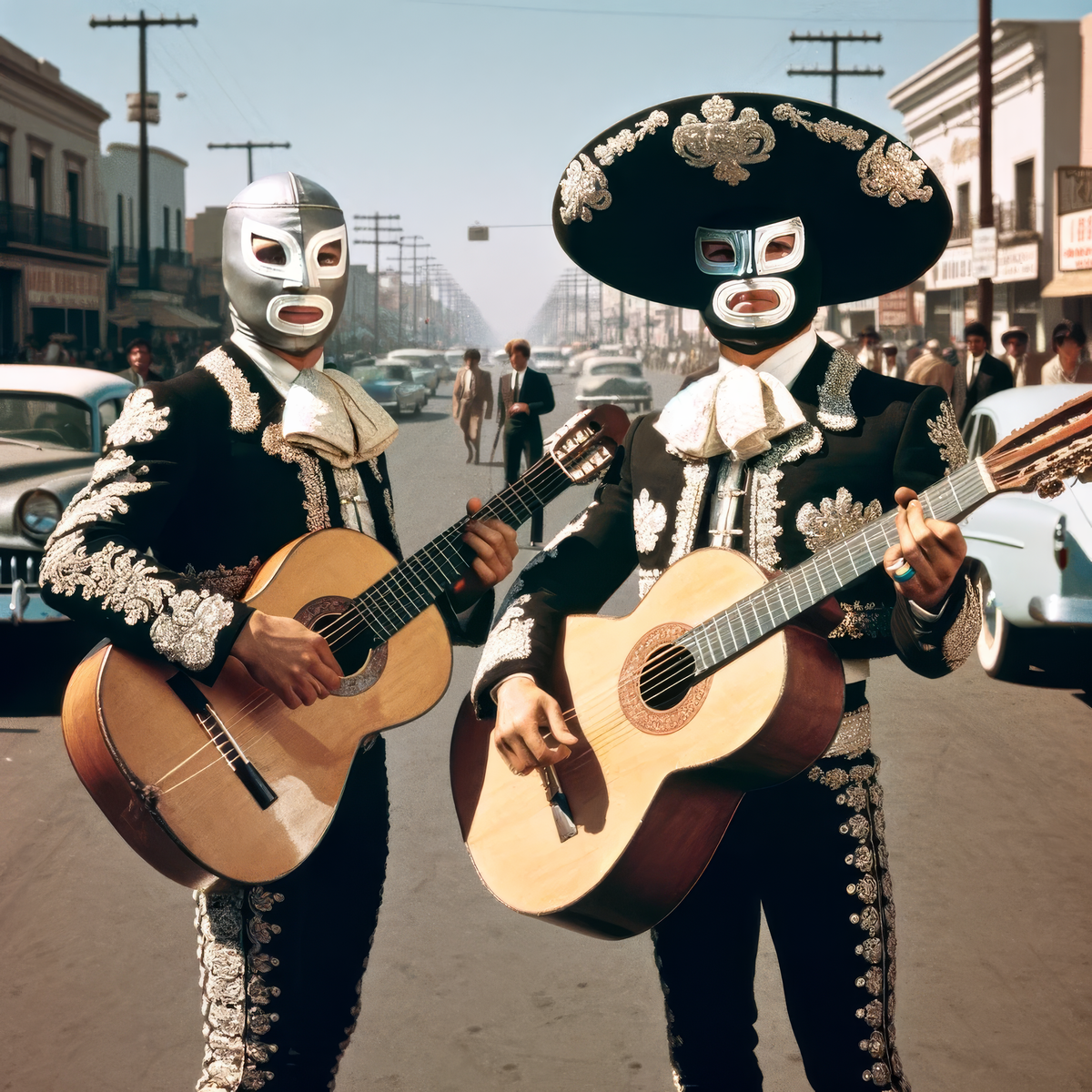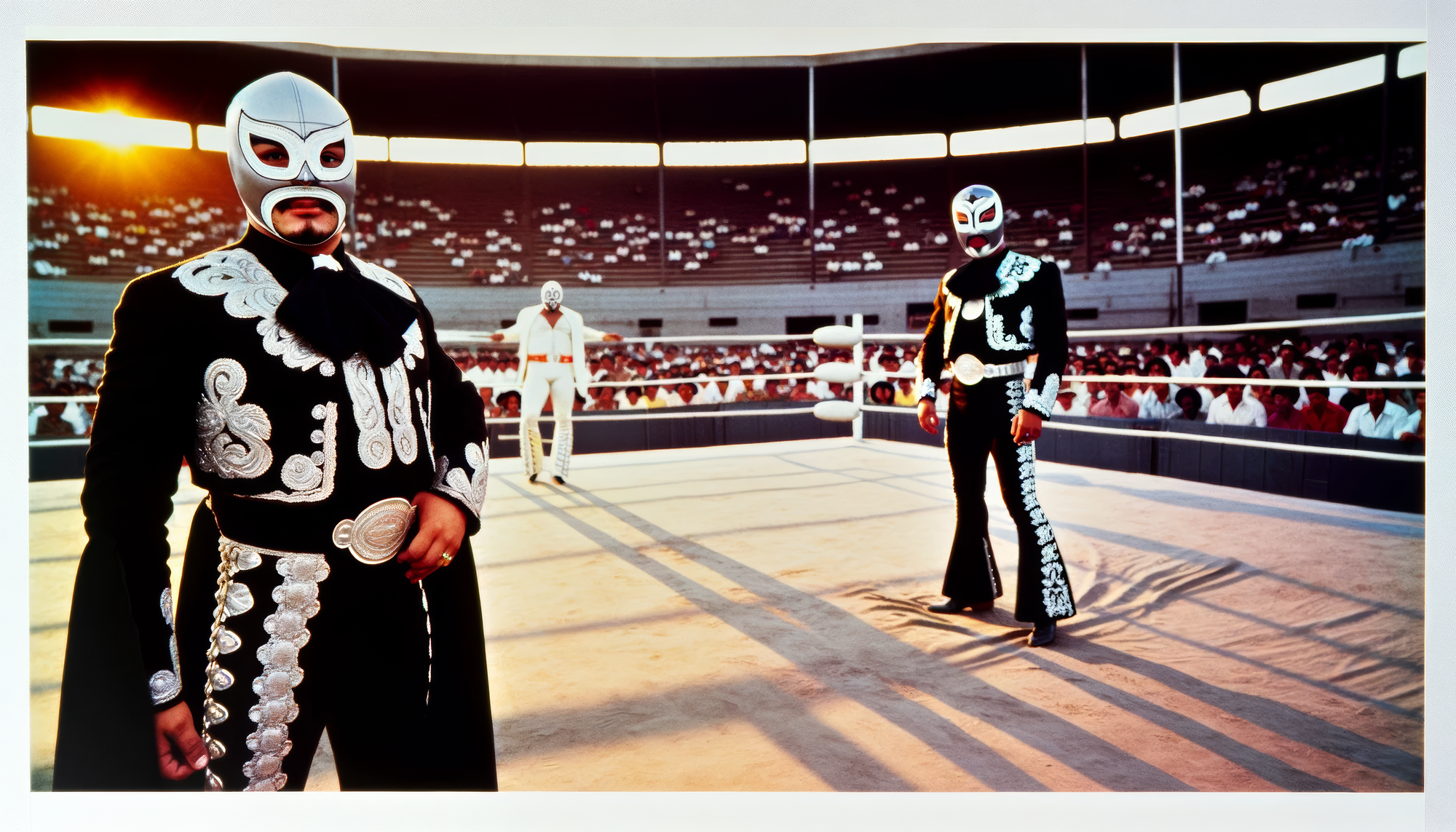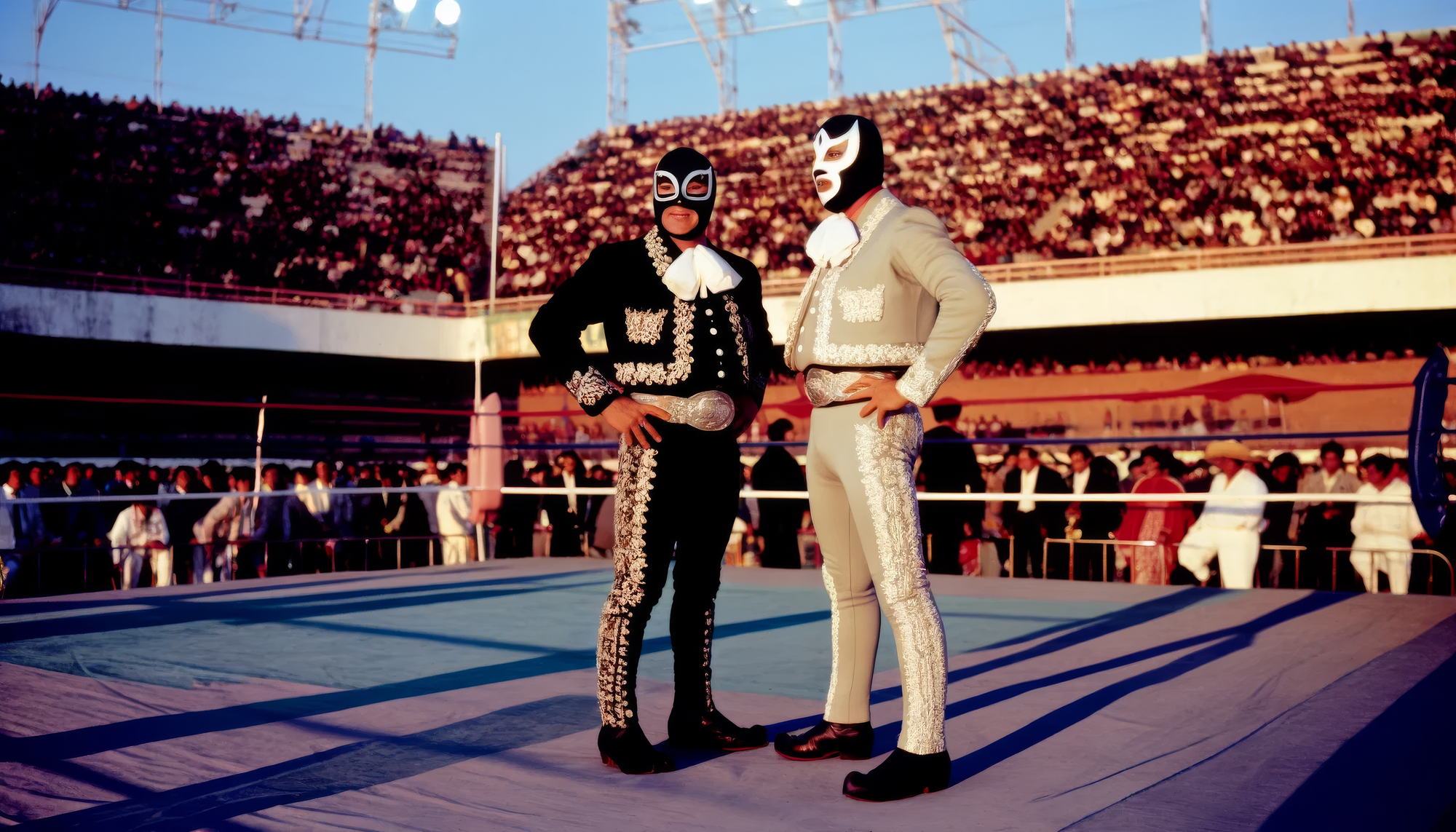The Midnight Maracas

The Midnight Maracas, or Las Maracas de Medianoche, a legendary tag team duo within the Great Western Wrestling Alliance, captivated fans with their unique blend of high-flying lucha libre and vibrant Mariachi culture. Comprised of El Guitarrón and El Violín, the duo soared to fame through their mesmerizing performances and skillful synergy in the ring. Renowned for their signature and devastating finisher, "The Mariachi Sleepover," a spectacular combination of strength and aerial finesse, they left opponents and audiences alike in awe. Although they never clinched the GWA Tag Team Championship, their legacy as cultural ambassadors and beloved tecnicos endures, making them an unforgettable part of wrestling history.
Joining the GWA
The Midnight Maracas, a dynamic tag team from the 1970s, seamlessly blended the vibrant spirit of Mariachi culture with the high-octane world of professional wrestling. Discovered in 1967 by Buck "Sagebrush" Thompson during a performance at the XEOJ-AM radio station offices in Ojinaga, Mexico, they quickly captivated audiences with their unique fusion of music and athleticism. El Guitarrón, the powerhouse, and El Violín, the high-flyer, donned traditional Mariachi attire, complete with intricately embroidered black charro suits and silver-adorned masks. Their ring entrance, accompanied by the live sounds of "Guadalajara" by Mariachi Vargas De Tecalitlán, became a hallmark of their performances, creating an electric atmosphere that set the stage for their in-ring prowess.
Team Member Profiles
El Guitarrón, named after the robust bass guitar integral to mariachi bands, honed his wrestling prowess in the lucha libre circuits of northern Mexico. Known for his sheer strength and imposing presence, he quickly became a pillar of reliability and performance in the ring. Embracing his cultural heritage, he adopted a mariachi-themed persona, donning a mask adorned with strings and soundholes that symbolizes his deep connection to the musical traditions of his roots. In the ring, he is the stoic powerhouse of The Midnight Maracas, utilizing his muscular build and endurance to dominate opponents, while his unexpected charisma captivates the audience.
El Violín complements his partner perfectly, bringing agility and flair to the duo. Starting his athletic career as a gymnast, he transitioned into wrestling drawn by its athletic spectacle, where his acrobatic skills quickly set him apart. His mask, featuring a treble clef and violin f-holes, mirrors his vibrant and playful persona. In matches, El Violín dazzles with his high-flying maneuvers and technical prowess, weaving through opponents with the grace of a seasoned performer. His ability to engage in psychological warfare adds a layer of complexity to his in-ring strategy, making him a formidable and unpredictable force.
Together, El Guitarrón and El Violín form a dynamic wrestling duo known as The Midnight Maracas. Their contrasting styles—El Guitarrón's grounded power and El Violín's aerial finesse—create a compelling synergy that makes their performances unpredictably exciting. Off the ropes, they embody the celebration of their rich cultural heritage, resonating deeply with fans and adding a profound layer of narrative to their matches. As tecnicos in the wrestling world, they not only showcase their formidable skills but also promote the values of hard work, respect, and joy inherent in Mariachi music, making them beloved figures in and out of the ring.
Persona

The Midnight Maracas were celebrated as beloved technicos, or good guys, within the Great Western Wrestling Alliance (GWA). They embodied the best aspects of Mariachi culture, showcasing passion, pride, and a strong sense of community. Their charisma and showmanship resonated with fans, who were drawn to their respectful homage to Mariachi traditions. In the ring, El Guitarrón’s strength and El Violín’s agility created a captivating dynamic, making them formidable opponents and crowd favorites. Their interactions with rivals were marked by a sense of honor and sportsmanship, reflecting their deep respect for their cultural roots and their commitment to entertaining and inspiring their audience.
Interview Style
In interviews, The Midnight Maracas exuded confidence and charm. They often began with a warm greeting in both Spanish and English, connecting with their diverse fan base. Their demeanor was upbeat and respectful, emphasizing their pride in their heritage. Catchphrases like "¡Viva la música, viva la lucha!" (Long live music, long live wrestling!) and "Con corazón y coraje" (With heart and courage) were staples of their promos. They were known for their thoughtful responses and genuine engagement with interviewers, often sharing anecdotes about their journey and the importance of Mariachi culture in their lives.
Ring Entrance Theme
The Midnight Maracas' entrance theme, "Guadalajara" by Mariachi Vargas De Tecalitlán, perfectly encapsulated their vibrant and celebratory persona. This iconic Mariachi song, with its lively melodies and rich cultural significance, created an electrifying atmosphere as they made their way to the ring. The use of spirited Mariachi music not only enhanced their entrance but also reinforced their connection to their cultural roots, making it an unforgettable experience for fans.
Wrestling Style & Signature Moves
In the ring, The Midnight Maracas combined technical skill with high-flying acrobatics and raw power, creating a dynamic and entertaining wrestling style. El Guitarrón, the powerhouse, utilized his strength to execute powerful slams, suplexes, and clotheslines, with moves like the "Guitarón Slam" (a body slam) and the "Mariachi Powerbomb." El Violín, the agile high-flyer, dazzled with springboard attacks, drop kicks, and aerial maneuvers, including the "Violin Dive" (a top rope dive) and the "String Theory" (a complex submission hold).

Their signature move, "The Mariachi Sleepover," was a devastating combination where El Guitarrón lifted the opponent into a powerbomb position while El Violín performed a high-flying splash from the top rope, culminating in a synchronized impact that left the opponent incapacitated. In fact, the only wrestler to ever kick out of The Mariachi Sleepover was Renegade Riders member, Tommy Tucker. This move, along with their energetic and cohesive teamwork, cemented their reputation as one of the most exciting and beloved tag teams in GWA history.
Notable Achievements and Accolades
While The Midnight Maracas never clinched the GWA Tag Team Championship, their contributions and performances in the Great Western Wrestling Alliance have garnered them a significant following and several notable accolades:
- Cultural Ambassadors Award (1976) - Recognized by GWA for their unique blend of wrestling and Mariachi culture, The Midnight Maracas were honored for promoting Mexican heritage and enriching the wrestling community’s cultural diversity.
- Fan Favorite Team of the Year (1972) - Voted by the fans, this accolade was awarded to The Midnight Maracas for their engaging performances and charismatic interaction with the audience, making them one of the most beloved teams of that year.
- Match of the Year (1972) - They were part of the "Match of the Year" against The Renegade Riders, a highly acclaimed bout that is still talked about for its dramatic storytelling and high-flying maneuvers.
- Lifetime Achievement Recognition (1992) - Shortly before the GWA ceased operations in 1993, The Midnight Maracas were recognized with a Lifetime Achievement award for their long-standing contributions to the league and their impact on the sport’s cultural integration.
These accolades highlight not just their prowess in the ring but also their role as cultural icons within the wrestling community. The Midnight Maracas left an indelible mark on the GWA, remembered for their vibrant performances and the joy they brought to their fans.
Memorable Matches and Rivalries
Throughout their illustrious career in the Great Western Wrestling Alliance (GWA), The Midnight Maracas participated in numerous memorable matches and rivalries that not only showcased their skill and charisma but also defined the narrative landscape of the wrestling world during their time.
Rivalry with The Renegade Riders (1972):
One of the most defining moments in their career occurred in 1972 during a climactic battle with The Renegade Riders. Amidst internal strife and the looming dissolution of The Renegade Riders, The Midnight Maracas faced them during the peak of their own prowess. The match was electric, filled with tension and high stakes. The climax came when Tommy Tucker of The Renegade Riders miraculously kicked out of the "Mariachi Sleepover," challenging the invincibility of The Midnight Maracas' famed finishing move. This controversial finish sparked heated debates among fans and added a complex layer to the ongoing narrative, marking it as one of the most dramatic encounters in GWA history.
Feud with The Serpent Twins (1982):
Their rivalry with The Serpent Twins highlighted in the Summer of 1982, where The Midnight Maracas showcased their trademark blend of high-flying maneuvers against the deceitful tactics of the twins. The final match in the program ended in a disqualification victory for The Midnight Maracas after one of the Twins resorted to illegal weaponry. This victory underscored their resilience and adherence to the principles of fair play, juxtaposing their honorable tactics against the underhanded strategies of their opponents.
Clash with Southern Comfort (1977):
Perhaps one of the most culturally charged clashes was with Southern Comfort during the 1977 GWA Great Western Grand Tag Team Round-up. Southern Comfort, consisting of "The Gentleman" James Montgomery and "Bayou" Benny Lacroix, brought a blend of Southern aristocracy and bayou cunning to the ring. Their approach, which combined polite yet merciless tactics with a raw, survivalist aggression, contrasted sharply with The Midnight Maracas' more performance-driven and ethically grounded wrestling style. Despite the initial dominance of Southern Comfort, The Midnight Maracas utilized their agility and teamwork to overcome the challenge, securing a victory that was celebrated not only for its physicality but also for its affirmation of cultural pride and integrity.
Each of these encounters served not just as matches but as narratives that enriched the GWA's lore, weaving The Midnight Maracas' respect for their heritage and their skill in the ring into the larger tapestry of professional wrestling. Their career, marked by these significant rivalries and matches, not only entertained fans but also left a lasting impact on the cultural and ethical dimensions of wrestling entertainment.





